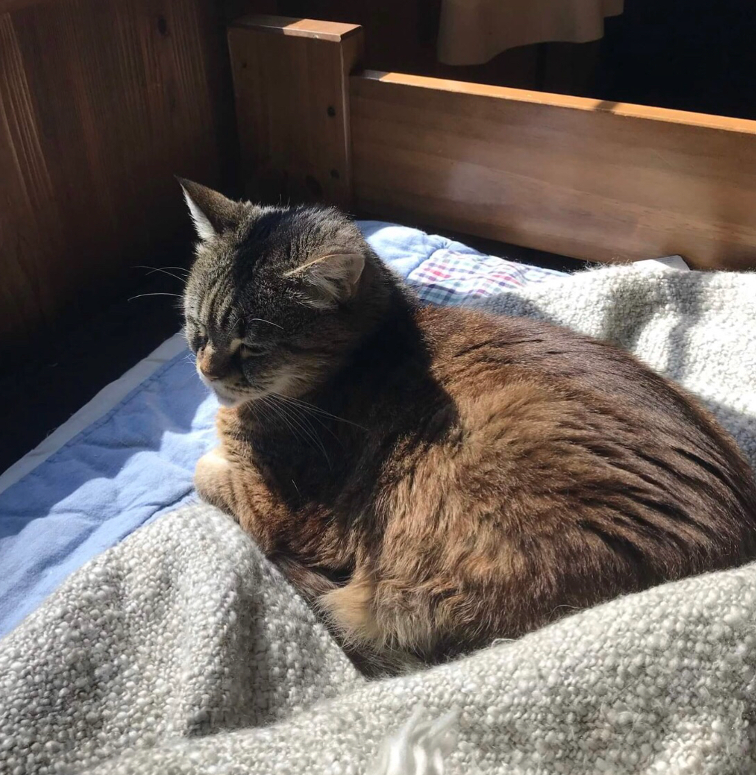By Deborah H. Anderson
Sheba the Brave captured my heart the first time I met her. A brown tabby who looked more ocelot than cat, we greeted each other, she on her stool and me on my chair, knees to front paws. Suddenly, she stood and crawled into my lap. Her foster mom exclaimed, “I’ve never seen her do that before!” I began to pet Sheba, she purred loudly, and our destiny was sealed. Two kindred spirits with parallel disabilities and needs who became devoted to each other.
Adopting Sheba began with a misunderstanding, an important misunderstanding. All over the country, there is caution within animal shelter culture about letting people with disabilities adopt. The mission to “find good homes” includes an incomplete understanding of disabilities. On a good day, I walk like a well-oiled Tin Man. On a less-good day, I approximate C3PO. It’s bragging rights to a good surgeon and medical team that I’m not in a wheelchair. So it was that the first cat I chose was denied to me. There was an unfounded fear he might charge my feet and cause me to fall.
Living with mobility issues since age nine, when a drunk driver pushed a car engine over my lower half and crushed it, I’m fairly adept at staying upright. A cat is no match for my skills, I say with a smile. When I shared the story of the first cat with my activist friends and colleagues, there was one response, “Go get a cat!” Then the office of civil rights got wind of it, and they wanted to sue on my behalf. “No thank you,” I said, “But will you be my sounding board while I do this my way and build a bridge?” Disabled people are constantly making the most of opportunities to educate. It is both wearying and satisfying.
Since 1992, I have been a strong supporter of the mission, work, and volunteers of the Vashon Island Pet Protectors. They are good, kind people, devoted to the well-being of Island animals. So it was that I scrolled through the pictures of animals for adoption, and there she was. “Sheba hops like a bunny with her hind legs due to injuries.”
Well, Sheba, I walk funny, too. As a kitten, Sheba was mauled by a dog. A very good vet pieced her back together, giving a pucker to her mouth that looked like she was perpetually ready to kiss someone. Eleven years old, the crushed spine, the traumatic brain injury, a mysterious mass in her stomach, and aggressive behavior. She was on the “probably unadoptable” list.
About to sign the final papers, we reviewed Sheba’s lengthy medical records. Spinal damage “Oh that’s the same as me!” Meds. “Oh, I’m on a steroid, too.” I signed a release absolving VIPP of liability, and we went home.
It soon became apparent that Sheba’s aggressive behavior might be from overmedication. ‘Roid rage is real. Working with the Fair Isle vets, I cut her dose in half. Knowing about traumatic brain injury, I adjusted my behavior when sundowning set in or if Sheba woke in the night and was disoriented. I’d spent my life using my education and skills to support special-needs kids and families. It was a gift to now share them with this loving, sweet cat who, like me, had had an irregular life. Many negative behaviors lessened.
I thoroughly enjoyed spoiling her with love. Her favorite position was stretched out lengthwise by my left side. Her head nestled in my armpit, she would purr loudly, wanting us to gaze into each other’s eyes while I sang her lullabies. I knew from the beginning that every day was a gift.
Gradually, I realized that she was teaching me. I began to understand I had never lived with someone who was physically disabled. Recognizing I had never truly accepted my injuries, Sheba taught me to love my body as is. To push less, to rest more, to consider myself whole just as I am. She, by example and interaction, set me free. No daily apology for taking up space, being slow and awkward, needing accommodations and accessibility, or failing to keep up. That ship finally sailed.
Too soon, the mysterious mass took her. She took a turn and was gone in four days; 19 months was all we had. I returned her to the Island for her resting place.
This summer, I will miss vacationing on the Island with her. I will walk about the house saying “Sheba, I miss you. Sheba, I love you.” I am grateful. In that mystical way animals have, I believe she knew I had learned what she came to teach me.
The beautiful dark is sometimes a place of trauma, injury, or ignorance. Love is the torch that pierces it, such that light shines through, revealing that the dark is also life-giving. Contentiousness and woundedness are not to be avoided. They are to be faced head-on and heart in. Embrace that which scares or causes you sorrow. It can be a source of renewal.

